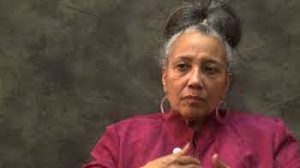
Doris Derby
*Doris Derby was born on this date in 1939. She was a Black activist, documentary photographer, director, and adjunct associate professor.
Doris Adelaide Derby's parents met in New York and married in the mid-1930s. She was raised in Williamsbridge, the outskirts of the Bronx. While in a predominantly white elementary school, she noticed a lack of black representation in her textbooks, movies, advertisements, and the arts. For this reason, she was motivated to make a change.
In elementary school, she began to study dance formally and received a scholarship to study at the Katherine Dunham African dance classes at the Harlem YMCA. Derby's association with the American Civil Rights movement began when she joined the NAACP Youth Chapter in her hometown church at 16. She continued her association with the Student Nonviolent Coordinating Committee (SNCC) while attending Hunter College in New York. She was a Christian Human Relations Group member at the college, where they discussed segregation, sit-ins, and the Freedom Riders.
In 1960, Derby was approaching her last year in college when she visited countries such as Nigeria, France, and Italy. She began appreciating cultural differences and learning about the countries' struggles. She also visited the Navajo Indian Reservation, where she saw the economic inequalities the population was experiencing. In 1963, Derby, an elementary school teacher, was recruited to work in an adult literacy program initiated by the SNCC at Tougaloo College in Mississippi.
During this time, Derby roomed with Sandra "Casey" Hayden and Hellen Jean O'Neal-McCray, who developed literacy materials to help prepare blacks to pass the required yet discriminatory literacy test for voter eligibility in Mississippi. Derby made many contributions during her time at Tougaloo College with John O'Neal, another SNCC worker on the literacy project, and Gilbert Moses, a journalist for the Jackson Free Press.
Most notably, she co-founded the Free Southern Theater (FST). Derby felt that a repertory theater company could travel throughout the state and incorporate all the arts by developing a cultural format. It created space for interaction with the people in the movement and the grassroots community who had suffered the most. The theater would be a vehicle that could inform and perhaps reveal new creative strategies to deal with the institution of Jim Crow segregation. "We needed to look into ourselves in order to empower ourselves and reclaim the freedom we did not have in Mississippi and other southern states." Derby saw a need to create a cultural, artistic tool that could involve, inspire, enlighten, and galvanize black people to think critically and create for themselves.
The theater allowed black people to creatively take on issues within the context of the civil rights movement. It sparked social change, justice, equal opportunity, and citizenship, regardless of race. From 1963 to 1972, Derby served as an SNCC field secretary in various capacities in Jackson, Mississippi, in the Council of Federated Organizations (COFO), the Mississippi Freedom Democratic Party (MFDP), the Poor Peoples' Corporation (PPC), and the Child Development Group of Mississippi (CDGM) Head start Program.
During this period, she worked on preparations for Freedom Summer, taught in various educational enrichment programs, and promoted local arts and culture. She also helped incorporate Liberty House Cooperative Marketing, an arm of the PPC. Derby was also involved in these groups' marketing, public relations, and training.
In 1967, she joined Southern Media, Inc., a documentary, photography, and filmmaking group in Jackson, Mississippi, that traveled throughout the state to document people's lives, struggles, initiatives, and gains in and around the movement. She lectured and exhibited at Jackson State College on African art and culture. Derby left Mississippi in 1972 and focused on African and African American studies. She earned an MA and a Ph.D. in social anthropology from the University of Illinois at Urbana–Champaign. In 1990, she joined Georgia State University as an adjunct associate professor of anthropology.
Derby lived in Atlanta, Georgia, with her husband, actor Bob Banks, whom she married in 1995. They were active leaders in their community and members of local and national organizations. She was the founding director of the Office of African American Student Services and Programs (OAASSP). Her department's achievements included retaining and graduating many black students and enhancing cultural and educational ties between African, Caribbean, Latin, and African American students and the community.
She co-founded the Performing and Visual Arts Council (PVAC) at Georgia State University in 2008. At the end of 2012, Derby retired from Georgia State University after 22 years of service. She also taught at the College of Charleston, the University of Illinois, and the University of Wisconsin. Her "trials and tribulations" in the SNCC and FST in Mississippi are reflected in her independently published book Poetagraphy: Artistic Reflections of a Mississippi Lifeline in Words and Images: 1963–1972 (2019). On March 28, 2022, Doris Derby died in Atlanta from cancer at 82.